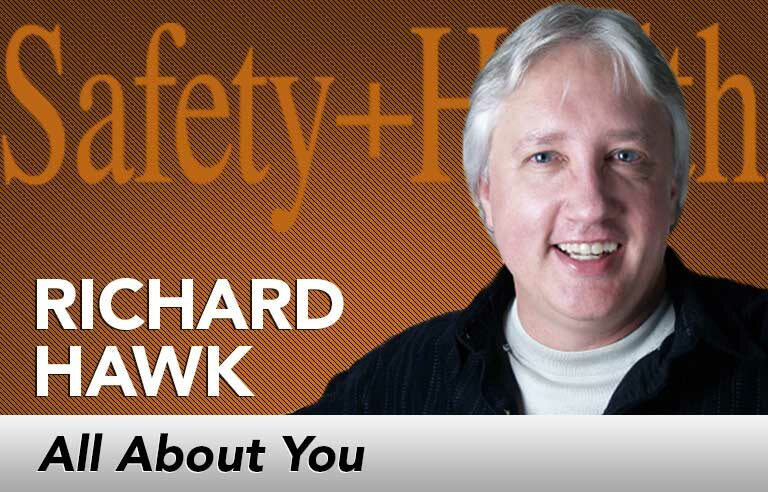All About You: Get the most out of conventions and conferences

EDITOR’S NOTE: Motivating employees to work safely is part of the safety professional’s job. But who motivates the motivator? In this monthly column, veteran safety pro and professional speaker Richard Hawk offers his entertaining brand of wisdom to inspire safety pros to perform at their best.
Are you going to the National Safety Council 2019 Congress & Expo in San Diego? If you are, and it’s your first time, I’m sure you’ll be delightfully surprised by the event’s size and all the opportunities you’ll have to learn and network.
I’ve attended the council’s main event several times, and I’m always impressed by how well it’s organized. I’ve also had the privilege of hosting several Professional Development Seminars, Technical Sessions and three closing keynotes.
Attending conventions and conferences is a mainstay of my profession, and I’ve learned some things over the years that have help me get the most out of them, which I’d like to share.
Have specific objectives
A colleague of mine always writes down what he wants to accomplish and learn before he attends a convention. It’s a great idea, and one that I copy – although my list isn’t as extensive as his. (You should see his list!) A few of his dozens of goals include how many new people he wants to meet, what trends he wants to learn more about, and how many new ideas he can use to improve his effectiveness as a safety and health consultant.
My list this year will include finding out about companies that are including mindfulness as part of their safety and health program, and how well it’s been received.
Hone your ‘small talk’ skills
Small talk is often regarded as meaningless, but according to Debra Fine, author of “The Fine Art of Small Talk: How to Start a Conversation, Keep It Going, Build Networking Skills – and Leave a Positive Impression!” it “will create pathways and channels for new opportunities to present themselves.” Fine says you can develop your small talk skills just like any other skill. I heartily agree, and I’ve written several times about how you can improve all kinds of communication skills by purposely practicing them.
When you meet someone, be sure to smile as though you’re meeting a longtime friend. Can you practice smiling? Of course! Notice how people react to your smiles, and vary them slightly to see what kind of results you get. It’s amazing how a smile can make a person feel comfortable and get your small talk off to a great start.
To start, say “hello,” offer your hand, tell the person your name before you ask for theirs, and then have a few opening remarks ready besides “Where do you work?” or “Where are you from?” Not that they aren’t fine opening remarks, but more specific questions such as “Have you been to this conference before?” or “Did you go to the reception last night?” put you both on more common ground and tend to lead to a longer conversation.
From that point on, be sure to show interest in the person’s responses and ask follow-up questions, rather than focus on yourself.
A final note on small talk: Be mindful of your smartphone use so it doesn’t get in the way of your chances to network. (See Sharpening your social skills in the smartphone age, Safety+Health, October 2017.)
Share what you learn
Share what you have discovered and experienced, both during the event and when you return home and to work. My wife always asks me when I get home, “What was the highlight of your trip?” So, usually on the plane, I review my notes and think about what happened. That way I’m ready to give her a thought-out answer. Writing a brief narrative can also help you be more prepared to share the highlights of your experience.
I’ll be hosting a “Mindfully Safe” Professional Development Seminar this year and an “All About You” Technical Session based on this column. Whether or not you attend one of my sessions, I hope we get to meet and give each other a big smile!
This article represents the views of the author and should not be construed as a National Safety Council endorsement.
Richard Hawk helps safety professionals become better leaders through his keynotes, workshops, articles and books so they can create vibrant safety cultures. His popular “Mindfully Safe” keynote teaches employees how to focus better and improve their situational awareness, a key skill to preventing incidents. To contact Richard, visit makesafetyfun.com.
Direct to your inbox: Sign up to be notified in email about new "All About You" columns.
Listen on Soundcloud or Stitcher
Post a comment to this article
Safety+Health welcomes comments that promote respectful dialogue. Please stay on topic. Comments that contain personal attacks, profanity or abusive language – or those aggressively promoting products or services – will be removed. We reserve the right to determine which comments violate our comment policy. (Anonymous comments are welcome; merely skip the “name” field in the comment box. An email address is required but will not be included with your comment.)

